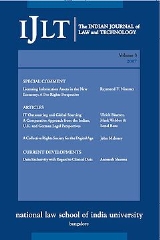
Indian Journal of Law and Technology
Encyclopedia
The Indian Journal of Law and Technology is an annual peer-reviewed
law journal
produced by students of the National Law School of India University
, Bangalore
, India
. It is managed and published by the Law and Technology Committee of the Student Bar Association
at the National Law School.
The journal was established in 2005. Notable contributors are William Patry, Gavin Sutter, Benjamin Edelman, Yochai Benkler
, Donald S. Chisum, Raymond T. Nimmer, John Frow
, Lawrence Liang
, and Shamnad Basheer. The journal publishes articles, notes, and book review
s discussing legal issues on technology law in general, including e-commerce
, cybercrime
, biotechnology
, bioethics
, competition law
, outsourcing, relevant public policy
, intellectual property
issues posed by technology, telecommunications, and evidential technology.
Peer review
Peer review is a process of self-regulation by a profession or a process of evaluation involving qualified individuals within the relevant field. Peer review methods are employed to maintain standards, improve performance and provide credibility...
law journal
Law review
A law review is a scholarly journal focusing on legal issues, normally published by an organization of students at a law school or through a bar association...
produced by students of the National Law School of India University
National Law School of India University
The National Law School of India University is the leading institution for undergraduate and graduate legal education in India. By popular estimates, the school consistently ranks as the most prestigious law school in India...
, Bangalore
Bangalore
Bengaluru , formerly called Bengaluru is the capital of the Indian state of Karnataka. Bangalore is nicknamed the Garden City and was once called a pensioner's paradise. Located on the Deccan Plateau in the south-eastern part of Karnataka, Bangalore is India's third most populous city and...
, India
India
India , officially the Republic of India , is a country in South Asia. It is the seventh-largest country by geographical area, the second-most populous country with over 1.2 billion people, and the most populous democracy in the world...
. It is managed and published by the Law and Technology Committee of the Student Bar Association
Bar association
A bar association is a professional body of lawyers. Some bar associations are responsible for the regulation of the legal profession in their jurisdiction; others are professional organizations dedicated to serving their members; in many cases, they are both...
at the National Law School.
The journal was established in 2005. Notable contributors are William Patry, Gavin Sutter, Benjamin Edelman, Yochai Benkler
Yochai Benkler
Yochai Benkler is an Israeli-American professor of Law and author. Since 2007, he has been the Berkman Professor of Entrepreneurial Legal Studies at Harvard Law School. He is also a faculty co-director of the Berkman Center for Internet & Society at Harvard University.- Biography :In 1984, Benkler...
, Donald S. Chisum, Raymond T. Nimmer, John Frow
John Frow
John Frow is an Australian professor and Chair of English Language and Literature at the University of Melbourne. He was educated at Wagga High School and the Australian National University, and has lived and worked in South America in 1970 and 1971 and then did graduate studies from 1971 to 1975...
, Lawrence Liang
Lawrence Liang
Lawrence Liang is an Indian Chinese legal researcher and lawyer based in the city of Bangalore, who is known for his legal campaigns on issues of public concern...
, and Shamnad Basheer. The journal publishes articles, notes, and book review
Book review
A book review is a form of literary criticism in which a book is analyzed based on content, style, and merit. A book review could be a primary source opinion piece, summary review or scholarly review. It is often carried out in periodicals, as school work, or on the internet. Reviews are also often...
s discussing legal issues on technology law in general, including e-commerce
Electronic commerce
Electronic commerce, commonly known as e-commerce, eCommerce or e-comm, refers to the buying and selling of products or services over electronic systems such as the Internet and other computer networks. However, the term may refer to more than just buying and selling products online...
, cybercrime
CyberCrime
CyberCrime was an innovative, weekly America television program on TechTV that focused on the dangers facing computer users. Filmed in San Francisco, California, the show was hosted by Alex Wellen and Jennifer London...
, biotechnology
Biotechnology
Biotechnology is a field of applied biology that involves the use of living organisms and bioprocesses in engineering, technology, medicine and other fields requiring bioproducts. Biotechnology also utilizes these products for manufacturing purpose...
, bioethics
Bioethics
Bioethics is the study of controversial ethics brought about by advances in biology and medicine. Bioethicists are concerned with the ethical questions that arise in the relationships among life sciences, biotechnology, medicine, politics, law, and philosophy....
, competition law
Competition law
Competition law, known in the United States as antitrust law, is law that promotes or maintains market competition by regulating anti-competitive conduct by companies....
, outsourcing, relevant public policy
Public policy
Public policy as government action is generally the principled guide to action taken by the administrative or executive branches of the state with regard to a class of issues in a manner consistent with law and institutional customs. In general, the foundation is the pertinent national and...
, intellectual property
Intellectual property
Intellectual property is a term referring to a number of distinct types of creations of the mind for which a set of exclusive rights are recognized—and the corresponding fields of law...
issues posed by technology, telecommunications, and evidential technology.
Editors in chief
- Karthik Ashwin Thiagarajan (2004–2005, Vol. 1)
- Sarayu Natarajan (2005–2006, Vol. 2)
- Thomas John (2006–2007, Vol. 3)
- Chaitanya Ramachandran (2007–2008, Vol. 4)
- Raman Jit Singh Chima (2008–2009, Vol. 5)
- Ashutosh Kumar (2009–2010, Vol. 6)
- Bhavishyavani Ravi (2010-2011, Vol. 7)

